CVTE
Dental Assisting
Jason Cieto, Academy B Administrator – Ext. 632
Course & Program of Studies
Statement of Purpose
The Dental Assistant program provides students with an overview of dental assisting and gives them experience in the dental field. It provides the educational background and vocational skills necessary for entry-level positions as dental assistants. The skills of a Dental Assistant are diverse and challenging with a wide range of tasks that require interpersonal as well as technical skills. Students receive training in basic and expanded dental functions. The program includes classroom theory and clinical practice. Additional time is spent gaining experience in a variety of dental offices. Sophomore students participate in a community service project by bringing their knowledge to various preschools.
Students also acquire administrative skills; communication skills; and knowledge of dental terminology, anatomy, dental materials, infection control and radiology. The Massachusetts Board of Registration in Dentistry has approved the school’s radiography course as an acceptable pathway toward state radiography certification. Students who complete the course and pass a hands-on written exam are recognized as radiography-certified dental assistants. Qualified students receive this certification at the end of their junior year. Students also become CPR certified for the Health Care Provider from the American Heart Association and complete the Five Hour OSHA on-line program.
Upon completion of the program, qualified dental assistant students are certified in Radiography and are able to take the Dental Assisting National Board Examination for Radiation Health and Safety and Infection Control. This program prepares students for employment as dental assistants and for post-secondary education.
Our Dental Assisting program provides students with the skills and knowledge needed to succeed in the dynamic field of dentistry. Through a combination of classroom instruction and hands-on clinical experience, students will learn:
- Clinical Skills: Chairside assisting, dental procedures, sterilization, and infection control.
- Radiology: Taking and processing dental X-rays.
- Patient Care: Providing compassionate patient care and building rapport with patients.
- Dental Materials: Understanding the properties and applications of dental materials.
- Dental Terminology: Mastering dental terminology and medical terminology.
- Safety and Compliance: Adhering to OSHA and HIPAA regulations.
By the end of the program, students will be well-prepared to enter the workforce as dental assistants. They will be equipped with the skills and certifications needed to assist dentists in providing quality dental care.
Exploratory Program
Freshmen Exploratory is a program that provides students with a basic overview of the dental profession and how a Dental Assistant plays an important role in the care of patients. Students will learn entry level hands-on skills (competencies) such as identifying permanent teeth, and anatomical tooth structures using correct terminology. Clinical procedures will include seating and dismissing the dental patient and instrument identification. Obtaining alginate impressions, pouring and trimming gypsum models for the fabrication of study models will take place in the dental laboratory.
The Freshman Dental Assisting Exploratory program provides an introduction to the world of dental assisting. Students will gain hands-on experience in basic dental procedures, including:
- Patient Care: Learning how to greet and dismiss patients, prepare them for treatment, and provide comfort during procedures.
- Dental Instruments: Identifying and using various dental instruments and equipment.
- Dental Terminology: Understanding dental terminology related to teeth, tissues, and procedures.
- Dental Materials: Learning about different dental materials and their applications.
- Dental Laboratory Techniques: Gaining experience in pouring and trimming dental models.
Through these experiences, students will develop a solid foundation in dental assisting and be prepared to advance to more complex procedures in their sophomore year.
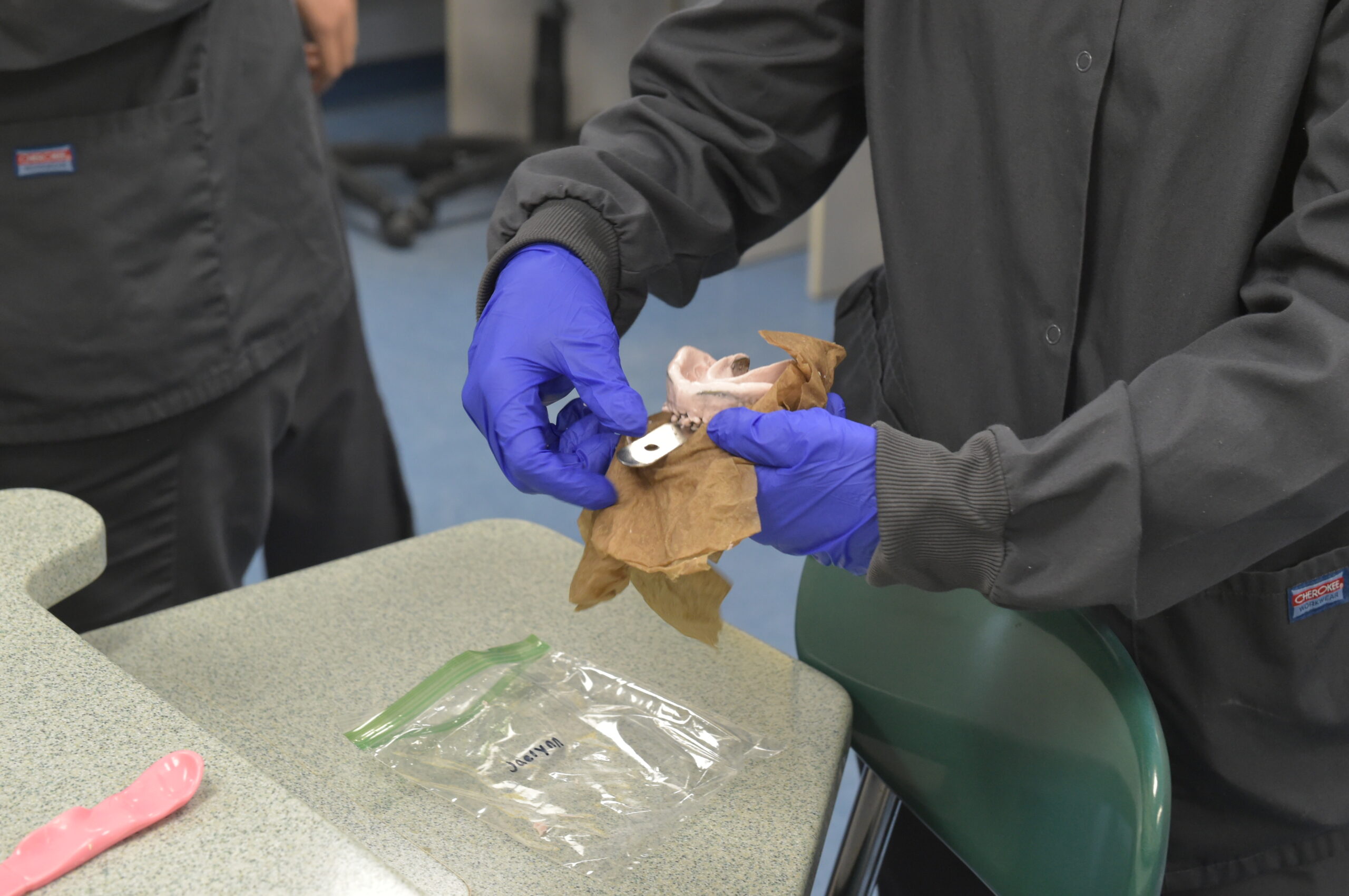
Freshman Program
The Freshmen Dental Assistant Course is a half year program. Students are exposed to the dental profession and importance is placed on becoming part of the dental team. Instruction focuses on the student introduction to basic chairside assisting procedures. Topics covered include greeting, seating and dismissing the patient, preparation of the treatment room, administering disclosing agents, providing oral hygiene instruction and obtaining vital signs. The student pays close attention to OSHA guidelines within the treatment area, and will demonstrate the principles of infection control including hand washing, donning and removing personal protective equipment, use of chemical disinfectants, ultrasonic cleaners, sterilizers and instrument storage.
The dental assistant student identifies tooth anatomy and uses the universal method of tooth identification. Dental charting of conditions affecting the permanent and deciduous dentitions using electronic patient management software will be performed in both shop and administrative skills. The student will practice and promote good oral hygiene and become knowledgeable about the oral disease process and importance of
practicing good nutrition.
The Freshman Dental Assisting course provides students with a strong foundation in dental assisting principles and techniques. Key topics covered include:
- Patient Care: Greeting, seating, and dismissing patients; providing a comfortable and supportive environment.
- Dental Terminology: Understanding and using dental terminology accurately.
- Dental Anatomy: Identifying tooth anatomy and numbering systems.
- Introduction to Dental Charting: Recording patient information, including medical history, dental history, and treatment plans.
- Oral Hygiene: Educating patients on proper oral hygiene practices.
Through a combination of classroom instruction and hands-on practice, students will develop the essential skills and knowledge needed to succeed in the dental field.
Sophomore Program
The sophomore dental assistant course is a 90 day program, which provides the student with the knowledge and practical skills required to perform dental assistant functions. The student will learn to administer chairside assistance for the dentist in the transferring of instruments and proper maintenance of the operating site. These tasks include proper suction tip placement, dental dam application and use of dry-angles and cotton rolls. Students will also place and remove various types of dental matrices. The student is trained to support the dentist as well as the patient in the treatment room. The student practices the current concepts of four-handed dentistry and exhibits practical knowledge of dental equipment and its use. Students will practice routine care and maintenance and maintain and understand the importance of universal precautions to protect patients and themselves.
The dental assistant student identifies dental equipment and instruments for their use, care and sterilization or disinfection. Students will learn to prepare dental materials for restorative procedures such as composite and amalgam restorations. Alginate impressions, obtaining bite registrations and pouring gypsum laboratory models will be performed. Students will have the opportunity to make custom fitted mouth guards and have experience using a variety of laboratory equipment.
Upon successful completion of this course, students will have met the standards set by the American Dental Assistants Association and the Vocational Technical Education Frameworks. Students will also prepare for the Infection Control certification exam administered by the Dental Assistant National Board.
The Sophomore Dental Assisting course builds upon the foundational knowledge and skills acquired in the freshman year. Students will gain advanced clinical skills, including:
- Chairside Assisting: Providing efficient and effective chairside assistance during dental procedures.
- Dental Materials: Preparing and handling dental materials, such as amalgam, composite, and impression materials.
- Advanced Dental Charting.
- Advanced Dental Instrumentation
- Expanded Functions: Assisting chairside for orthodontic speciality
- Dental Laboratory Techniques: Pouring and trimming dental models, fabricating custom mouthguards, and using dental laboratory equipment.
- Infection Control: Adhering to strict infection control protocols to maintain a safe and sterile environment.
- Patient Care: Providing compassionate and empathetic patient care.
By the end of the course, students will be well-prepared to enter the dental workforce as competent dental assistants. They will be able to perform a wide range of clinical and administrative tasks under the supervision of a dentist.
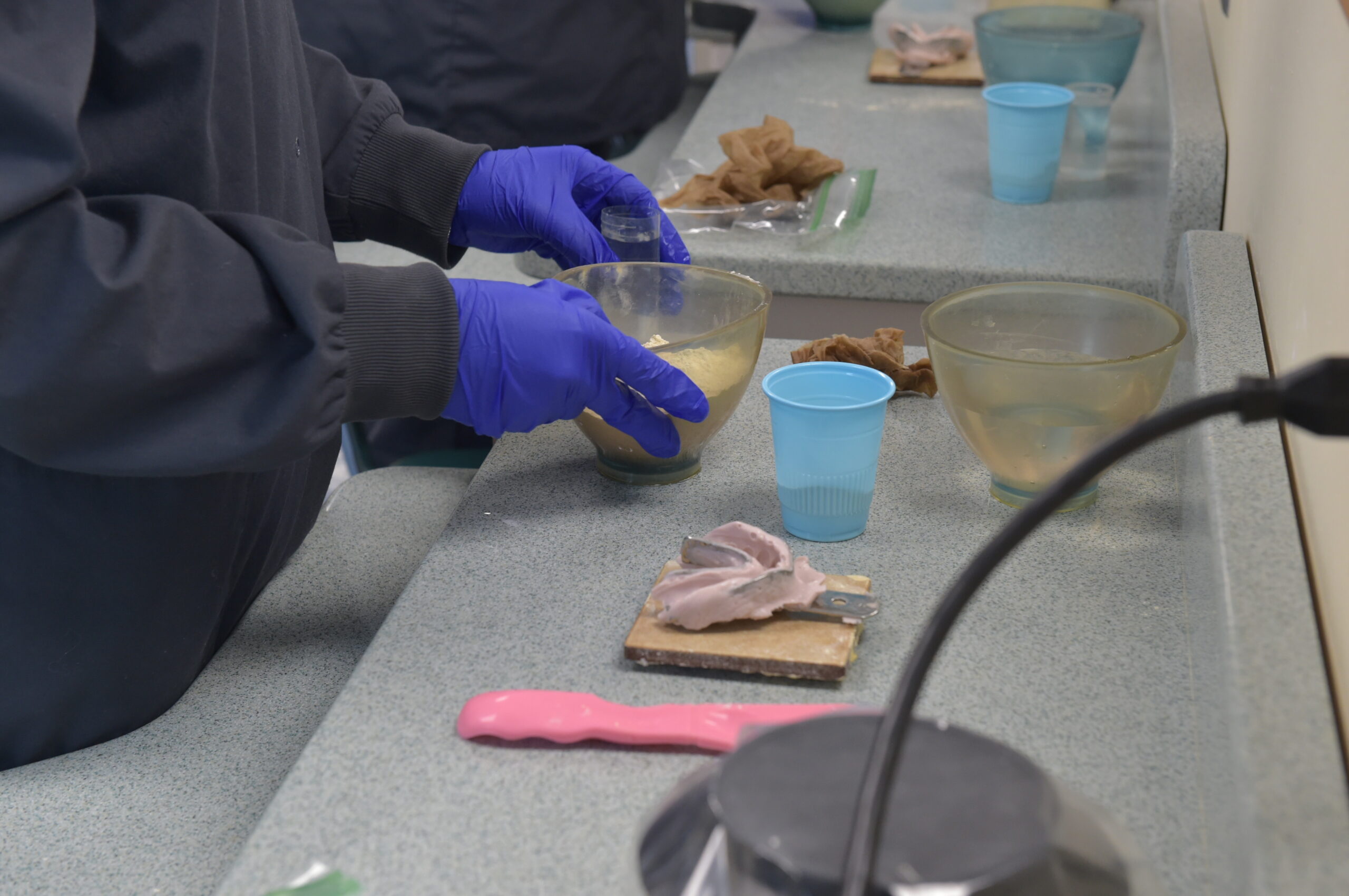
Sophomore Related Class 1
Infection Control
The infection control course offered sophomore year as a part of the dental assisting curriculum. Each unit of study will include the introduction of new key terms, chapter learning objectives, lecture and assessments. Each unit will address key components of infection control including microbiology, and disease prevention specific to dentistry, national guidelines, recommendations and regulations affecting the dental practice. Additional components will include environmental health and safety, and office communications regarding infection control techniques in the dental office.
The Infection Control course provides students with a comprehensive understanding of infection control principles and practices in the dental setting. Key topics covered include:
- Microbiology: Understanding the basic principles of microbiology, including the structure and function of microorganisms.
- Disease Transmission: Learning about the modes of transmission of infectious diseases, such as direct contact, indirect contact, and airborne transmission.
- Infection Control Protocols: Implementing effective infection control measures, including hand hygiene, personal protective equipment, and instrument sterilization.
- Environmental Infection Control: Maintaining a clean and disinfected dental operatory.
- OSHA Regulations: Adhering to OSHA regulations for dental offices, including exposure control plans and hazard communication.
- Waste Management: Properly handling and disposing of infectious waste.
- Patient Education: Educating patients about oral health and infection prevention.
By the end of the course, students will be well-prepared to implement infection control protocols in a dental office, protecting both patients and dental staff from the spread of infectious diseases.
Sophomore Related Class 2
Dental Assistant Medical Terminology
A dental assisting medical terminology course typically covers the fundamental terminology used in dentistry and related healthcare fields. The course aims to familiarize students with terminology specific to dental anatomy, procedures, instruments, emergency care and conditions of the oral cavity. Topics may include anatomy and oral structures, functions of the oral cavity, dental materials, laboratory materials and diagnostic procedures. Students learn to effectively communicate with dentists, patients, and other healthcare professionals by understanding and using accurate terminology. Additionally, they may gain insights into medical abbreviations and symbols commonly used in dental records and communications. The course often combines lectures, demonstrations, interactive activities, and hands-on practice to reinforce learning.
This course provides a solid foundation in dental terminology, enabling students to effectively communicate with dental professionals and patients. Key topics covered include:
- Dental Anatomy: Understanding the structure and function of teeth, gums, and other oral tissues.
- Dental Procedures: Learning the terminology associated with various dental procedures, such as fillings, extractions, and root canals.
- Dental Materials: Familiarizing oneself with the properties and uses of different dental materials.
- Medical Terminology: Understanding common medical terms and abbreviations used in dentistry.
- Dental Charting: Learning to accurately chart dental conditions and treatment plans.
- Communication Skills: Developing effective communication skills to interact with patients and dental professionals.
By mastering dental terminology, students can enhance their efficiency and accuracy in performing dental assisting tasks and contribute to a positive patient experience.
Junior Program
Students are instructed in the most advanced skills used by a dental assistant, with special emphasis on skills used in the dental specialty practices and the dental laboratory. The students are prepared to become proficient in placing, exposing, processing and mounting both traditional and digital radiographs. Instruction is also focused on oral communication, administrative assistant skills, professionalism, refining basic skills, and direct patient care.
By the completion of the course, students are expected to demonstrate mastery in the areas of patient care and advanced dental assistant skills. This course provides students with the technical skills required to succeed in any dental office setting. Upon successful completion of this course, students will have met the standards set by the American Dental Assistants Association and the Vocational Technical Education Frameworks. Students will also be preparing for the Radiology Health and Safety exam administered by the Dental Assistant National Board.
The Junior Dental Assisting course provides students with advanced clinical skills and knowledge to prepare them for a successful career in the dental field. Key areas of focus include:
- Advanced Radiography: Mastering advanced radiographic techniques, including digital radiography and panoramic imaging.
- Dental Laboratory Techniques: Gaining proficiency in dental laboratory procedures, such as pouring and trimming models, fabricating custom trays, whitening trays, custom trays, surgical stents and fabricating temporary crowns.
- Expanded Functions: Performing expanded functions, applying topical anesthetics, coronal polishing and assisting chairside for all specialty procedures including crown and bridge, endodontics, oral surgery and periodontics.
- Sterilization and Infection Control: Adhering to strict infection control protocols to maintain a safe and sterile environment.
- Patient Education: Providing patient education on oral health and preventive care.
- Professionalism and Communication: Developing strong communication and interpersonal skills to interact effectively with patients and dental team members.
By the end of the course, students will be able to:
- Take high-quality dental radiographs.
- Process radiographic films or digital images.
- Mount radiographs correctly.
- Understand and apply radiation safety principles.
- Recognize common radiographic errors and their causes.
- Interpret basic radiographic images.
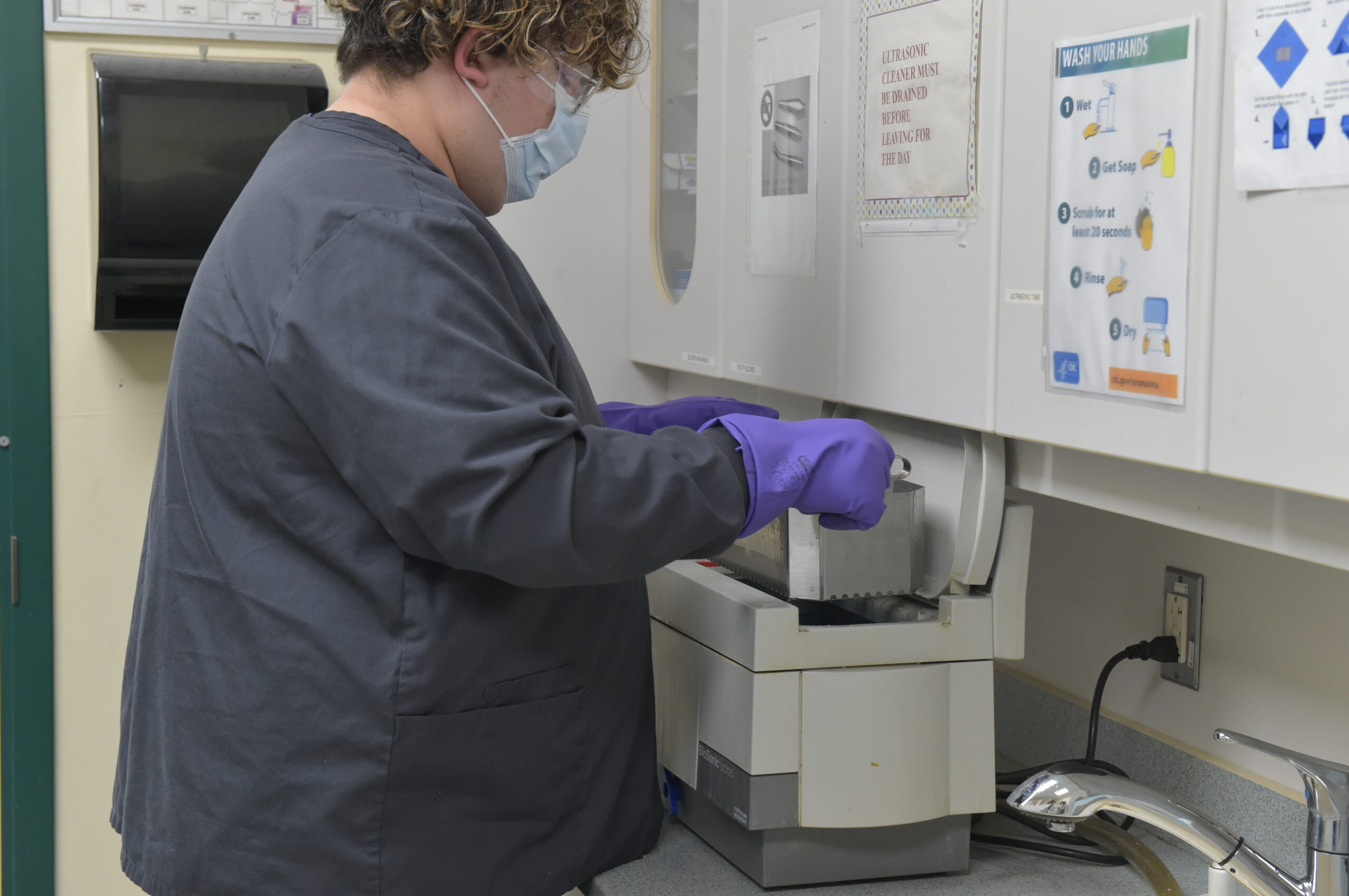
Junior Related 1
Head & Neck Anatomy
A head and neck anatomy course for dental assisting typically covers the fundamental structures and systems within the head and neck region relevant to dental practice. Course includes basic terminology, anatomical planes, and directional terms used in describing structures of the head and neck, cranial nerve functions, and distributions and study of the skull, including bones of the cranium, facial bones, and their landmarks important for dental procedures. This course also includes structures of the oral cavity, muscles, nerves and arteries of the head and neck, salivary glands and temporal mandibular joint.
This course provides a comprehensive understanding of the head and neck anatomy, essential for dental assistants. Key topics include:
- Basic Anatomy: Review of anatomical terminology, planes, and directional terms.
- Cranial Bones: Study of the bones of the cranium, including the frontal, parietal, temporal, occipital, sphenoid, and ethmoid bones.
- Facial Bones: Examination of the facial bones, such as the maxilla, mandible, zygomatic bones, nasal bones, and lacrimal bones.
- Oral Cavity Structures: Detailed study of the teeth, gums, tongue, palate, and salivary glands.
- Muscles of Mastication: Understanding the muscles involved in chewing and facial expression.
- Nerves and Blood Vessels: Exploration of the cranial nerves, blood vessels, and lymphatic drainage of the head and neck.
- Temporomandibular Joint (TMJ): Understanding the structure and function of the TMJ.
By the end of the course, students will be able to:
- Identify and locate key anatomical structures of the head and neck.
- Understand the functional relationships between different structures.
- Apply anatomical knowledge to dental procedures and patient care.
- Communicate effectively with dental professionals using accurate anatomical terminology.
Junior Related 2
Dental Radiology
Dental Radiology is a course offered to the dental assistant student during the junior year. The course will prepare the student to take the Radiology Health and Safety component of the Dental Assisting National Board examination. Students will study all aspects of dental radiology including the history, physics of radiology, function of the x-ray machine, safety, intraoral and extraoral exposure techniques, radiation biology, film placement and processing, mounting, traditional film and processing solutions, film placement and angulation errors and corrections, as well as film processing errors and corrections.
The Dental Radiology course provides a comprehensive understanding of dental radiography, covering both traditional and digital imaging techniques. Key topics include:
- Radiology Physics: Fundamental principles of x-ray production and radiation safety.
- Radiographic Positioning: Proper positioning for intraoral and extraoral radiographs.
- Radiation Biology: Understanding the effects of radiation on the human body and radiation safety protocols.
- Film Processing: Developing, fixing, and mounting radiographic films.
- Digital Radiography: Learning about digital radiography systems and image processing techniques.
- Quality Assurance: Ensuring the quality and consistency of radiographic images.
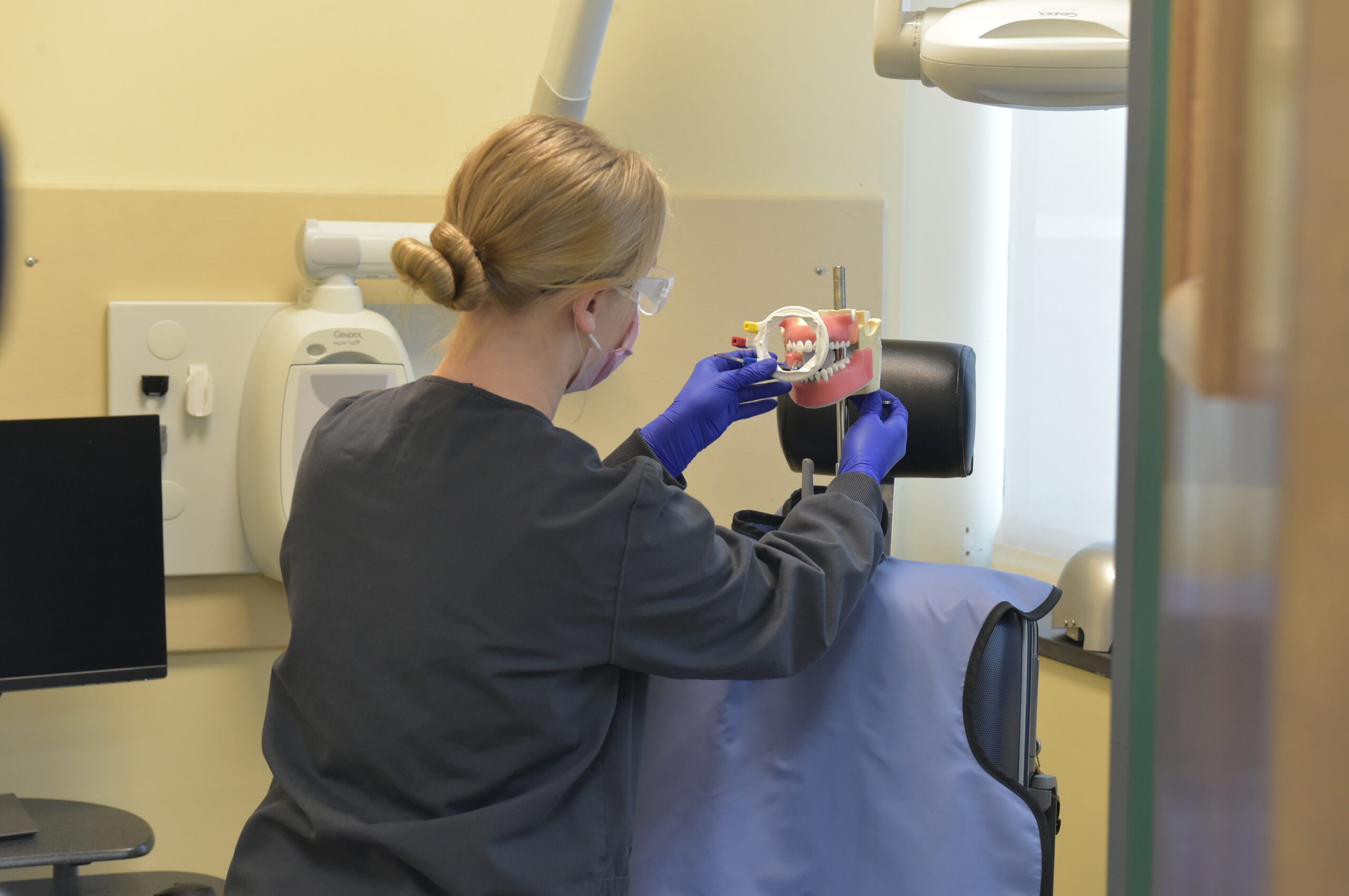
Senior Program
Dental students are now proficient in the most advanced skills used by a dental assistant. The students are proficient in exposing radiographs. Students participate in the program’s clinical placement rotation, including all dental specialties to further their skills in a professional learning environment. Students are eligible by meeting the guidelines of the Massachusetts Department of Education, interviews at dental offices and participating in the school’s Cooperative Education program. The student is then gainfully employed while having a strong learning environment to further refine their dental assistant skills. Post graduation the students will have met the requirements to become a Registered Dental Assistant (RDA).
Senior Dental Assisting students continue to refine their advanced clinical skills and gain real-world experience through clinical rotations. Key areas of focus include:
- Advanced Radiography: Mastering advanced radiographic techniques.
- Expanded Functions: Performing expanded functions under the direct supervision of a dentist.
- Dental Laboratory Procedures: Gaining proficiency in dental laboratory techniques, such as fabricating custom trays and pouring and trimming models.
- Infection Control: Adhering to strict infection control protocols to maintain a safe and sterile environment.
- Patient Care: Providing compassionate and empathetic patient care, including patient education and counseling.
- Clinical Rotations: Gaining hands-on experience in various dental specialties, such as orthodontics, endodontics, periodontics, pediatrics and oral surgery.
By the end of the program, students will be well-prepared to enter the dental workforce as Registered Dental Assistants (RDAs). They will be able to perform a wide range of clinical and administrative tasks, contributing to the efficient and effective operation of dental offices.
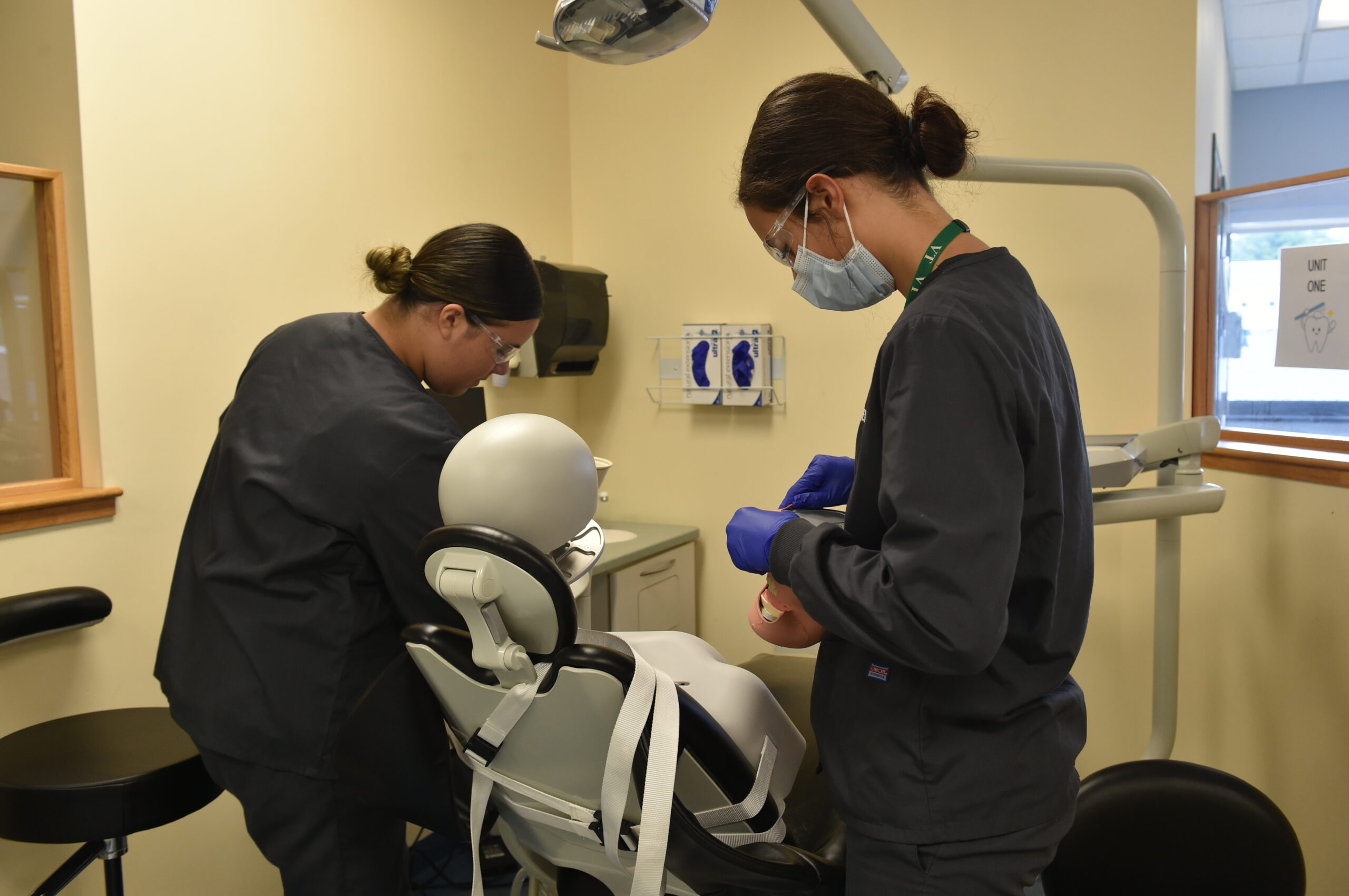
Senior Related 1
Tooth Morphology
Advanced Tooth Morphology is a course offered in the senior year curriculum of the Dental Assistant Program. This course will prepare the dental assistant student to identify normal, individual tooth anatomy and function, as well as abnormalities in individual teeth. Students will study the embryonic stages of tooth development and typical tooth eruption dates of the permanent dentition.
This advanced course delves deeper into the intricacies of tooth anatomy and development. Key topics covered include:
- Tooth Development: Understanding the stages of tooth development, from tooth bud formation to eruption.
- Tooth Anatomy: Detailed study of tooth structure, including enamel, dentin, pulp, and cementum.
- Tooth Morphology: Analyzing the variations in tooth shape, size, and surface features.
- Tooth Eruption Patterns: Understanding the normal sequence of tooth eruption.
- Tooth Anomalies: Recognizing common tooth anomalies, such as missing teeth, extra teeth, and malformations.
By the end of the course, students will be able to:
- Identify different tooth types and their functions.
- Recognize normal and abnormal tooth development.
- Understand the impact of tooth morphology on dental procedures.
- Communicate effectively with dental professionals regarding tooth anatomy and abnormalities.
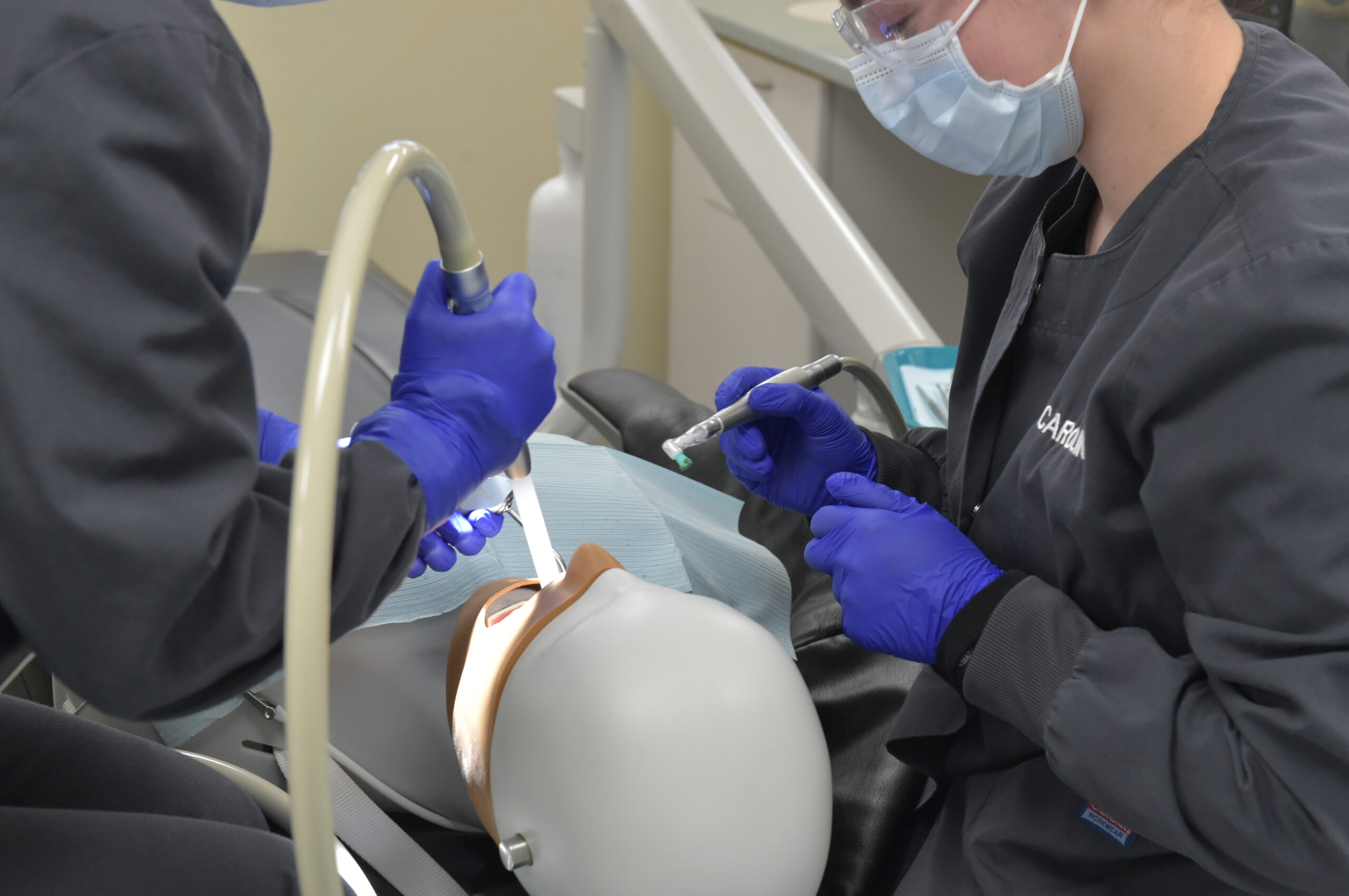
Senior Related 2
Dental Law & Ethics / Nutrition & Dental Health – Elective
Dental law & Ethics course will encompass a broad overview of legal and ethical principles relevant to the dental profession. This curriculum aims to educate students on the legal framework governing dental practice, as well as the ethical considerations that guide professional conduct.
The Nutrition & Dental Health delves into the fundamental principles of nutrition and dental health, equipping students with essential knowledge to maintain a healthy lifestyle. The curriculum will explore the relationship between diet, oral health, and overall well-being. Topics include the importance of balanced nutrition, understanding food groups, dietary guidelines, and the impact of nutrients on dental health. Additionally, students learn about common dental issues, preventive measures, oral hygiene practices, and the significance of regular dental check-ups.
This course provides a comprehensive overview of legal and ethical issues in dentistry. Key topics include:
- Dental Practice Act: Understanding the specific laws and regulations governing dental practice in the state of Massachusetts.
- Professional Conduct: Adhering to ethical principles and professional standards.
- Informed Consent: Obtaining informed consent from patients before treatment.
- Confidentiality and Privacy: Protecting patient confidentiality and privacy.
- Risk Management: Implementing risk management strategies to minimize liability.
- Professional Liability Insurance: Understanding the importance of professional liability insurance.
- Malpractice: Learning about the legal implications of dental malpractice.
Nutrition and Dental Health
This course explores the connection between nutrition and oral health. Key topics include:
- The Role of Nutrition in Oral Health: Understanding how diet affects oral health, including the impact of sugar, carbohydrates, and acidic foods.
- Dietary Guidelines: Following recommended dietary guidelines to promote oral health.
- Oral Hygiene: Practicing good oral hygiene habits, such as brushing, flossing, and using mouthwash.
- Preventive Dentistry: Learning about preventive dental measures, including dental sealants and fluoride treatments.
- Common Dental Problems: Understanding common dental problems and their prevention.
- The Impact of Systemic Diseases on Oral Health: Exploring the connection between systemic diseases and oral health conditions.
By understanding these topics, students can promote oral health and prevent dental diseases.
Certifications
- Radiology Health and Safe certification with Dental Assisting National Board
- Infection Control Certification with Dental Assisting National Board
- Chairside assisting certification with Dental Assisting National Board (DANB)
- CPR certified for Health Care Provider (BLS provider)
- OSHA 10 Certification
- NELDA (National Entry Level Dental Assisting) DANB
- Registered Dental Assistant (RDA)
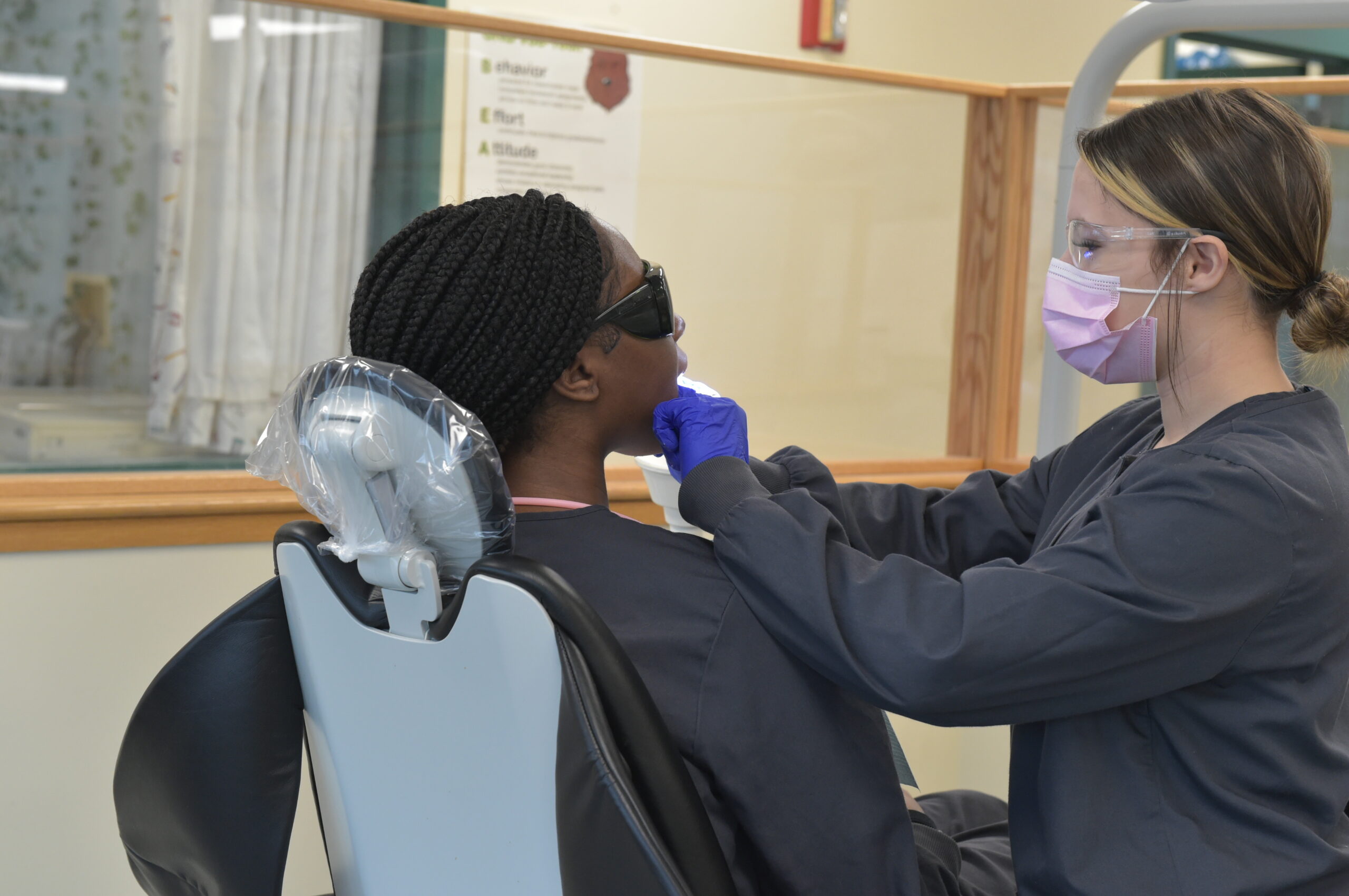
Career Opportunities
- General Chairside Assistant
- Dental Assistant Orthodontic Assistant
- Dental Receptionist/Administrative Assistant and Office Manager
- Dental Laboratory Technician
- Sterilization Assistant
Post-Secondary Education
- Dental Hygienist
- Dental Public Health Hygienist
- Dentist
- Dental Sales Representative


